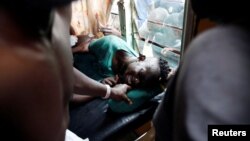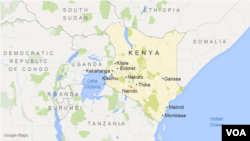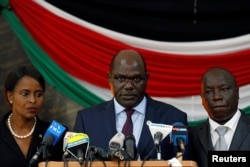The re-run of Kenya’s presidential election has inflamed political tensions in the country. Nowhere has that been more evident than in the opposition stronghold of Kisumu, where protests against the electoral commission continued Wednesday, the day before the vote.
Taking to the streets for the fifth time this week, Kisumu residents demanded reforms before Thursday’s presidential re-run. They marched to the electoral body offices. Police fired tear gas to disperse protesters throwing rocks and trying to block streets.
Meanwhile, VOA could find no signs of preparations for Thursday’s vote at polling stations around the city. Local media report some election officers failed to show up for duty in Kisumu for fear of attack.
"Why bring ballot boxes? In Kisumu, we do not want to vote,"said voter Harry Otieno. "Let IEBC officials not come to Kisumu.”
But Otieno has a plan.
“I have been to my polling station yesterday, and today [I] am going to camp there in the evening," he said. "We are going to make sure no IEBC official is in the polling station, and no one will enter. We are ready to die.”
Western Kenya is the home region of opposition leader Raila Odinga, and Kisumu, the region’s biggest city, has been the site of some of the fiercest protests during this electoral period.
Odinga pulled out of the presidential re-run two weeks ago, saying a credible election is not possible.
His calls for a boycott have been heard loud and clear in Kisumu. Concerns of violence may also keep voters from the polls.
“In Kisumu, there is one language," said voter Calvin Oringa. "They will not vote whether you [are] Jubilee party, whether you are NASA party coalition. ... If they marked ballot papers and brought it here, let them count and we see how many people voted and how many people did not vote.”
Speaking to reporters in Nairobi, the head of electoral commission, Wafula Chebukati, said in the event of violence or logistical problems, they might suspend voting in some areas.
“In cases where they will be problems of voting or delivery of materials or there are no materials, the law is very clear," said Chebukati. "The polling officer will have a right to inform us and polling can be suspended for another day, or the returning officer can still postpone the election in that area.”
Shops were closed Wednesday in Kisumu and the city was for the most part quiet. But many residents continue to display branches and leaves attached to the fronts of their cars and motorcycles. The gesture is a show of solidarity with protesters, and an indicator of the deep-seated tensions still simmering beneath the surface.






